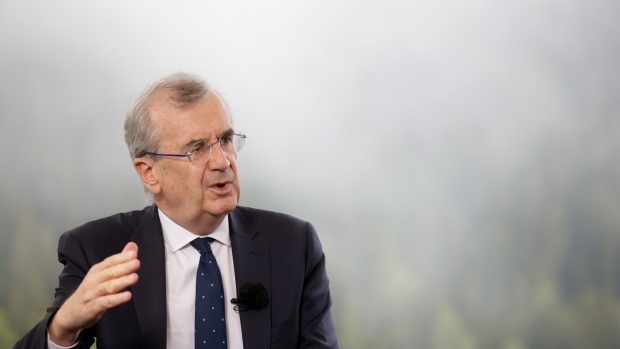Apr 21, 2024
ECB’s Villeroy Says Oil Uncertainty Won’t Stop June Rate Cut
, Bloomberg News

(Bloomberg) -- The European Central Bank won’t be swayed from a first interest-rate cut in June by oil price uncertainty, Governing Council member Francois Villeroy de Galhau said.
According to the Bank of France governor, even if conflict in the Middle East did push up oil costs, policymakers would have to first analyze if such a shock fueled underlying prices and inflation expectations. That means there’s no “mechanical” reaction, he said in an interview with Les Echos published Sunday.
Asked if uncertainty could delay the start of monetary easing, he said “no — unless there is a surprise, we must not wait too much.”
ECB officials are converging on their June 6 rate decision as the moment to start lowering borrowing costs. Villeroy has been a vocal supporter of such a move, while his more hawkish colleagues have expressed varying levels of conviction, with some saying it’s only a rising likelihood.
“From the point we have sufficient confidence in the fact that we will meet the 2% inflation objective by next year, our duty is to minimize the cost in terms of activity and employment,” Villeroy said. “That is the sense of a first cut in June.”
Even as June becomes more certain, the ECB’s course thereafter is less so as rate-setters are divided on how much easing to commit to. Villeroy said there will be subsequent future cuts at a “pragmatic pace.”
“We will always have the capacity to adapt this if an external shock threatened disinflation,” he said.
Villeroy also said ECB rate cuts won’t depend on the Federal Reserve, which is expected to wait longer before easing policy. The ECB will look at effects on the euro under such a scenario, while not targeting any specific level for the currency, he said.
“When I talk about pragmatic gradualism, that means we’ll look at all the data,” Villeroy said when presenting his annual letter to the French president on Monday. “But we’re determined by European data, not US data.”
(Updates with currency comments starting in last two paragraphs.)
©2024 Bloomberg L.P.






